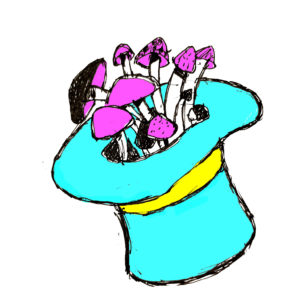From time to time, everyone experiences increased heart rate, racing thoughts and an anxious stomach. It’s a primitive part of our brain working in overdrive, with some stimuli in the environment having triggered it.
This is anxiety. According to the Anxiety and Depression Association of America, 18.1 percent of United States residents over 18 suffer from anxiety. Of that, only 36.9 percent end up seeking treatment. Many of those who do seek help often end up turning toward medication. Medications serve a great purpose in alleviating anxiety; unfortunately, they end up falling short in some areas. Mental health professionals have raised concerns about medications; while they may help suppress symptoms of anxiety, in certain instances, they aren’t getting to the core of the actual issue and are often dangerously habit forming.
However, there is an unexpected alternative: Hallucinogens as anti-anxiety medications are part of a research renaissance. Before their total ban and illegalization in the U.S. in the 1970s, research on MDMA, LSD, peyote and other drugs was underway. Many psychologists at the time saw a bright future in their medicinal usage. However, politics at the time sought to criminalize and target certain social movements and racial groups, some well-known for using hallucinogens such as antiwar, leftist counterculture hippies. Thus began the War on Drugs.
After constant pushing from psychedelic pioneers such as Timothy Leary, who declared the benefits of individuality and freedom of the mind, the government pushed back by banning all psychedelics including psilocybin, the psychoactive chemical found in some mushrooms. Consequentially, funding for research around psychedelics became sparse.
Within the last 30 years, researchers at John Hopkins, New York University and other institutions have been doing quiet work around the potential benefits of psilocybin mushrooms, particularly their potential use for therapy. This could lead to an exciting new era in the field of mental health, especially in battling anxiety-based disorders and conditions such as Obsessive Compulsive Disorder and Post-Traumatic Stress Disorder.
What is psilocybin?
Psilocybin is a natural psychoactive substance and the active ingredient in psychedelics known as magic mushrooms. When taken, the body and substance together produce mind-altering states and hallucinations. This mind alteration includes feelings of euphoria as well as visions, a loosened grip on time and nausea. However, psilocybin also temporarily slows down activity in the amygdala—the area of the brain responsible for emotions and, when overstimulated, anxiety and depressive disorders. When psilocybin is present, it decreases anxiety and increases happiness. Psilocybin has also been credited for allowing a more vivid recall memory.
Used in a therapeutic setting with the right dosage and mindset, psilocybin creates a calmer experience when revisiting traumatic emotions or memories during guided sessions with medical professionals. This sets the stage for vital therapeutic work around anxiety and other mental disorders.
A study in 2013 found psilocybin reduced depression and anxiety suffered among life-threatening cancer patients. Patients reported feeling less hopelessness and despair and more feelings of satisfaction. Six and a half months later, participants reported feeling better about the prospect of death. Other studies have shown similar results: Most participants still feel positive effects from their therapeutic session months and even years later.

Risks of psilocybin
Current research actually shows psilocybin mushrooms to have low toxicity; in fact, a higher dosage is required for an overdose than what is present within psilocybin. Moreover, very few people who have been part of studies based around psilocybin report negative long-term effects in their mood or behavior. In short, psilocybin is a relatively low-risk drug despite its categorization as a Schedule I drug generally thought to have no potential medical uses.
Negative connotations around psychedelics exist, and rightfully so—when they are abused. However, there is massive untapped potential that has been overlooked. There is pushback from conservatives, but the positive effects are undeniable. When it comes to psilocybin ’shrooms, the future looks magical.






